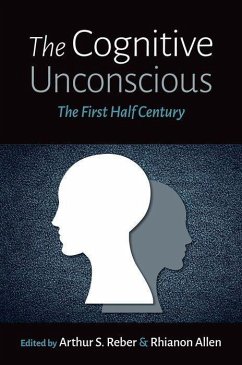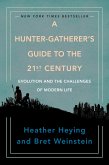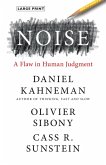- Gebundenes Buch
- Merkliste
- Auf die Merkliste
- Bewerten Bewerten
- Teilen
- Produkt teilen
- Produkterinnerung
- Produkterinnerung
The Cognitive Unconscious provides an overview of fifty years of research into unconscious cognition. Its focus is on the role that unconscious processes play in perception, cognition, personality, and social processes. The book brings together some of the leading minds in the field to both summarize past research findings and highlight potential research avenues for the future.
Andere Kunden interessierten sich auch für
![The Oxford Handbook of Evolutionary Psychology and Religion The Oxford Handbook of Evolutionary Psychology and Religion]() James R LiddleThe Oxford Handbook of Evolutionary Psychology and Religion200,99 €
James R LiddleThe Oxford Handbook of Evolutionary Psychology and Religion200,99 €![The Oxford Handbook of Evolutionary Psychology and Parenting The Oxford Handbook of Evolutionary Psychology and Parenting]() The Oxford Handbook of Evolutionary Psychology and Parenting173,99 €
The Oxford Handbook of Evolutionary Psychology and Parenting173,99 €![The Science of Life The Science of Life]() Alan MacfarlaneThe Science of Life161,99 €
Alan MacfarlaneThe Science of Life161,99 €![Oxford Handbook of Evolutionary Psychology and Behavioral Endocrinology Oxford Handbook of Evolutionary Psychology and Behavioral Endocrinology]() Oxford Handbook of Evolutionary Psychology and Behavioral Endocrinology206,99 €
Oxford Handbook of Evolutionary Psychology and Behavioral Endocrinology206,99 €![A Hunter-Gatherer's Guide to the 21st Century A Hunter-Gatherer's Guide to the 21st Century]() Heather HeyingA Hunter-Gatherer's Guide to the 21st Century22,55 €
Heather HeyingA Hunter-Gatherer's Guide to the 21st Century22,55 €![Noise Noise]() Daniel KahnemanNoise30,29 €
Daniel KahnemanNoise30,29 €![Evolutionary Psychopathology Evolutionary Psychopathology]() Marco Del GiudiceEvolutionary Psychopathology115,99 €
Marco Del GiudiceEvolutionary Psychopathology115,99 €-
-
-
The Cognitive Unconscious provides an overview of fifty years of research into unconscious cognition. Its focus is on the role that unconscious processes play in perception, cognition, personality, and social processes. The book brings together some of the leading minds in the field to both summarize past research findings and highlight potential research avenues for the future.
Hinweis: Dieser Artikel kann nur an eine deutsche Lieferadresse ausgeliefert werden.
Hinweis: Dieser Artikel kann nur an eine deutsche Lieferadresse ausgeliefert werden.
Produktdetails
- Produktdetails
- Verlag: Hurst & Co.
- Seitenzahl: 400
- Erscheinungstermin: 29. Juli 2022
- Englisch
- Abmessung: 237mm x 160mm x 29mm
- Gewicht: 703g
- ISBN-13: 9780197501573
- ISBN-10: 0197501575
- Artikelnr.: 64532027
- Herstellerkennzeichnung
- Libri GmbH
- Europaallee 1
- 36244 Bad Hersfeld
- gpsr@libri.de
- Verlag: Hurst & Co.
- Seitenzahl: 400
- Erscheinungstermin: 29. Juli 2022
- Englisch
- Abmessung: 237mm x 160mm x 29mm
- Gewicht: 703g
- ISBN-13: 9780197501573
- ISBN-10: 0197501575
- Artikelnr.: 64532027
- Herstellerkennzeichnung
- Libri GmbH
- Europaallee 1
- 36244 Bad Hersfeld
- gpsr@libri.de
Arthur S. Reber is an Adjunct Professor in the Department of Psychology at the University of British Columbia. He completed his Ph.D. at Brown University under the direction of Richard Millward. His primary focus has been on implicit or unconscious learning based on principles of evolutionary biology. Rhianon Allen is Professor Emerita at Long Island University and an Affiliate Professor at the University of British Columbia.
* I. Foundational Issues
* Chapter 1: Implicit Learning: Background, History, Theory
* Arthur S. Reber
* Chapter 2: Procedural Memory: The Role of Competitive Neurocognitive
Networks Across Development
* Karolina Janacsek and Dezso Nemeth
* Chapter 3: Cognitive Neuroscience of Implicit Learning: Implications
for Complex Learning and Expertise
* Y. Catherine Han, Kevin D. Schmidt, Evan Grandoit, Peigen Shu, Caelie
P. McRobert, and Paul J. Reber
* Chapter 4: Implicit Cognition in the Face of Neurological Disorders:
Implications for Neural Mechanisms and Evolution
* Leib Litman and Shalom Noach Jaffe
* Chapter 5: The Cognitive Unconscious in Everyday Life
* John A. Bargh
* II. Distinctions between Implicit and Explicit Functions
* Chapter 6: Implicit Learning and Language Acquisition: Three
Approaches, One Phenomenon
* Patrick Rebuschat
* Chapter 7: Implicit Learning in Healthy Aging: Evidence from
Probabilistic Sequence Learning
* Darlene V. Howard and James H. Howard, Jr.
* Chapter 8: Implicit Learning of Motor and Perceptual Skills
* Julia M. Schorn and Barbara J. Knowlton
* Chapter 9: IQ, Adaptive Intelligence and Unconscious Processes
* Rhianon Allen
* III. Extensions and Applications
* Chapter 10: Human Unconscious Processes in situ: The Kind of
Awareness that Really Matters
* John A. Bargh and Ran R. Hassin
* Chapter 11: The Cognitive Unconscious and Dual Process Theories of
Reasoning
* Wim De Neys
* Chapter 12: Implicit Learning in Primates: Insights from Comparative
Research
* Benjamin Wilson and Holly E. Jenkins
* Chapter 13: The Locus of Focus and Curing the Yips
* Stephen M. Weiss and Richard S. W. Masters
* Chapter 14: From the Cognitive to the Collective: A Conceptualization
of the Unconscious in Organizations
* Elisabeth Brauner
* Chapter 15: The Unexplicated and its Consequences
* Harry Collins
* Chapter 16: Belief and the Cognitive Unconscious
* James E. Alcock
* Chapter 17: Implicit Social Cognition: A Brief (and Gentle)
Introduction
* Benedek Kurdi and Mahzarin R. Banaji
* Chapter 18: Implicit Learning of Emotional Structures: Implications
for Cognitive-Behavior Therapies
* Razvan Jurchis, Andrei Costea, and Adrian Opre
* Chapter 19: Perspectives on the Cognitive Unconscious
* Antonio Damasio
* Chapter 1: Implicit Learning: Background, History, Theory
* Arthur S. Reber
* Chapter 2: Procedural Memory: The Role of Competitive Neurocognitive
Networks Across Development
* Karolina Janacsek and Dezso Nemeth
* Chapter 3: Cognitive Neuroscience of Implicit Learning: Implications
for Complex Learning and Expertise
* Y. Catherine Han, Kevin D. Schmidt, Evan Grandoit, Peigen Shu, Caelie
P. McRobert, and Paul J. Reber
* Chapter 4: Implicit Cognition in the Face of Neurological Disorders:
Implications for Neural Mechanisms and Evolution
* Leib Litman and Shalom Noach Jaffe
* Chapter 5: The Cognitive Unconscious in Everyday Life
* John A. Bargh
* II. Distinctions between Implicit and Explicit Functions
* Chapter 6: Implicit Learning and Language Acquisition: Three
Approaches, One Phenomenon
* Patrick Rebuschat
* Chapter 7: Implicit Learning in Healthy Aging: Evidence from
Probabilistic Sequence Learning
* Darlene V. Howard and James H. Howard, Jr.
* Chapter 8: Implicit Learning of Motor and Perceptual Skills
* Julia M. Schorn and Barbara J. Knowlton
* Chapter 9: IQ, Adaptive Intelligence and Unconscious Processes
* Rhianon Allen
* III. Extensions and Applications
* Chapter 10: Human Unconscious Processes in situ: The Kind of
Awareness that Really Matters
* John A. Bargh and Ran R. Hassin
* Chapter 11: The Cognitive Unconscious and Dual Process Theories of
Reasoning
* Wim De Neys
* Chapter 12: Implicit Learning in Primates: Insights from Comparative
Research
* Benjamin Wilson and Holly E. Jenkins
* Chapter 13: The Locus of Focus and Curing the Yips
* Stephen M. Weiss and Richard S. W. Masters
* Chapter 14: From the Cognitive to the Collective: A Conceptualization
of the Unconscious in Organizations
* Elisabeth Brauner
* Chapter 15: The Unexplicated and its Consequences
* Harry Collins
* Chapter 16: Belief and the Cognitive Unconscious
* James E. Alcock
* Chapter 17: Implicit Social Cognition: A Brief (and Gentle)
Introduction
* Benedek Kurdi and Mahzarin R. Banaji
* Chapter 18: Implicit Learning of Emotional Structures: Implications
for Cognitive-Behavior Therapies
* Razvan Jurchis, Andrei Costea, and Adrian Opre
* Chapter 19: Perspectives on the Cognitive Unconscious
* Antonio Damasio
* I. Foundational Issues
* Chapter 1: Implicit Learning: Background, History, Theory
* Arthur S. Reber
* Chapter 2: Procedural Memory: The Role of Competitive Neurocognitive
Networks Across Development
* Karolina Janacsek and Dezso Nemeth
* Chapter 3: Cognitive Neuroscience of Implicit Learning: Implications
for Complex Learning and Expertise
* Y. Catherine Han, Kevin D. Schmidt, Evan Grandoit, Peigen Shu, Caelie
P. McRobert, and Paul J. Reber
* Chapter 4: Implicit Cognition in the Face of Neurological Disorders:
Implications for Neural Mechanisms and Evolution
* Leib Litman and Shalom Noach Jaffe
* Chapter 5: The Cognitive Unconscious in Everyday Life
* John A. Bargh
* II. Distinctions between Implicit and Explicit Functions
* Chapter 6: Implicit Learning and Language Acquisition: Three
Approaches, One Phenomenon
* Patrick Rebuschat
* Chapter 7: Implicit Learning in Healthy Aging: Evidence from
Probabilistic Sequence Learning
* Darlene V. Howard and James H. Howard, Jr.
* Chapter 8: Implicit Learning of Motor and Perceptual Skills
* Julia M. Schorn and Barbara J. Knowlton
* Chapter 9: IQ, Adaptive Intelligence and Unconscious Processes
* Rhianon Allen
* III. Extensions and Applications
* Chapter 10: Human Unconscious Processes in situ: The Kind of
Awareness that Really Matters
* John A. Bargh and Ran R. Hassin
* Chapter 11: The Cognitive Unconscious and Dual Process Theories of
Reasoning
* Wim De Neys
* Chapter 12: Implicit Learning in Primates: Insights from Comparative
Research
* Benjamin Wilson and Holly E. Jenkins
* Chapter 13: The Locus of Focus and Curing the Yips
* Stephen M. Weiss and Richard S. W. Masters
* Chapter 14: From the Cognitive to the Collective: A Conceptualization
of the Unconscious in Organizations
* Elisabeth Brauner
* Chapter 15: The Unexplicated and its Consequences
* Harry Collins
* Chapter 16: Belief and the Cognitive Unconscious
* James E. Alcock
* Chapter 17: Implicit Social Cognition: A Brief (and Gentle)
Introduction
* Benedek Kurdi and Mahzarin R. Banaji
* Chapter 18: Implicit Learning of Emotional Structures: Implications
for Cognitive-Behavior Therapies
* Razvan Jurchis, Andrei Costea, and Adrian Opre
* Chapter 19: Perspectives on the Cognitive Unconscious
* Antonio Damasio
* Chapter 1: Implicit Learning: Background, History, Theory
* Arthur S. Reber
* Chapter 2: Procedural Memory: The Role of Competitive Neurocognitive
Networks Across Development
* Karolina Janacsek and Dezso Nemeth
* Chapter 3: Cognitive Neuroscience of Implicit Learning: Implications
for Complex Learning and Expertise
* Y. Catherine Han, Kevin D. Schmidt, Evan Grandoit, Peigen Shu, Caelie
P. McRobert, and Paul J. Reber
* Chapter 4: Implicit Cognition in the Face of Neurological Disorders:
Implications for Neural Mechanisms and Evolution
* Leib Litman and Shalom Noach Jaffe
* Chapter 5: The Cognitive Unconscious in Everyday Life
* John A. Bargh
* II. Distinctions between Implicit and Explicit Functions
* Chapter 6: Implicit Learning and Language Acquisition: Three
Approaches, One Phenomenon
* Patrick Rebuschat
* Chapter 7: Implicit Learning in Healthy Aging: Evidence from
Probabilistic Sequence Learning
* Darlene V. Howard and James H. Howard, Jr.
* Chapter 8: Implicit Learning of Motor and Perceptual Skills
* Julia M. Schorn and Barbara J. Knowlton
* Chapter 9: IQ, Adaptive Intelligence and Unconscious Processes
* Rhianon Allen
* III. Extensions and Applications
* Chapter 10: Human Unconscious Processes in situ: The Kind of
Awareness that Really Matters
* John A. Bargh and Ran R. Hassin
* Chapter 11: The Cognitive Unconscious and Dual Process Theories of
Reasoning
* Wim De Neys
* Chapter 12: Implicit Learning in Primates: Insights from Comparative
Research
* Benjamin Wilson and Holly E. Jenkins
* Chapter 13: The Locus of Focus and Curing the Yips
* Stephen M. Weiss and Richard S. W. Masters
* Chapter 14: From the Cognitive to the Collective: A Conceptualization
of the Unconscious in Organizations
* Elisabeth Brauner
* Chapter 15: The Unexplicated and its Consequences
* Harry Collins
* Chapter 16: Belief and the Cognitive Unconscious
* James E. Alcock
* Chapter 17: Implicit Social Cognition: A Brief (and Gentle)
Introduction
* Benedek Kurdi and Mahzarin R. Banaji
* Chapter 18: Implicit Learning of Emotional Structures: Implications
for Cognitive-Behavior Therapies
* Razvan Jurchis, Andrei Costea, and Adrian Opre
* Chapter 19: Perspectives on the Cognitive Unconscious
* Antonio Damasio








